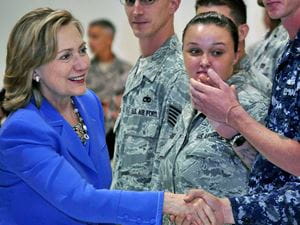
It would have to be a dark day, indeed, for America to ever reinstate the draft.
To reasonably require a draft—conscripting in a massive number of untrained, possibly unreliable recruits—the United States would have to be in a truly desperate situation. Consider why the draft ended; it is more useful to have a reasonably well-paid, professional volunteer force than a larger, less experienced, less committed force.
It would take a war effort bigger than anything we’ve seen since World War II, and a war effort supported by the majority of Americans—something that threatened us all, motivated us all to action.
Hillary Clinton supports legislation which would require women to register for the draft, legislation which will likely come to pass in the near future. In June, the Senate passed the National Defense Authorization Act, which, among other things, would require women to sign up for the draft. If the act makes it into law, the American military will have finally achieved full gender and sexual orientation integration—there will be no more male-only aspects of the military.
The amendment requiring women to sign up for the draft met opposition from more conservative senators, such as Senators Mike Lee and Ted Cruz, who worked to strip the amendment from the defense authorization act. Cruz, particularly, stated that the idea of including women in the draft, “makes little or no sense,” and will not vote for it without further public debate.
But let’s consider the issue further. Does it truly not make sense to have women register for the draft? I’d say it does, and here’s why.
The male-only draft is based on the cultural ideas of the 1970s, when men were the primary breadwinners of the home, and women were expected to care for children and take care of the affairs of the home. Men and women operated in very different spheres of life. The drafting of men made sense, because it left the parent at home who typically stayed at home with the children. Within the cultural norms of the time, this made a degree of sense. There was also the fact that many military positions were simply off-limits to women. Historically, women have been able to enlist, but were prohibited, until recently, from direct combat roles. There have traditionally been concerns over women’s ability to physically perform in a combat environment, as well as concerns about romantic relationships cropping up within units, pregnancies, and the propensity of male soldiers to prioritize keeping women safe over mission readiness.
Today, though, our culture is so far removed from that of the 1970s as to be nearly unrecognizable, and especially so within the inner workings of the family unit. Now men and women are nearly equally as likely to work outside the home, and more and more, men are the ones taking care of the home and children. So now, even a male-only draft is likely to take away the caregiver-figure of a home. And as for the concern that, with a draft of both sexes, children could be left without parents, there are provisions to ensure this never happens. Even during the Vietnam War, there were provisions for fatherhood which allowed a man to remain at home.
And women have proven capable of passing the most rigorous of these tests. Captain Kristen Griest, one of the first women to earn a Ranger tab, has become the army’s first female infantry officer, having passed the some of the most grueling physical challenges the military has to offer. She’s now gone on to be a great asset to U.S. military—one the army wouldn’t have if she had been barred for her gender.
As I’ve mentioned, it would take a catastrophic war to bring about the reinstatement of the draft, one in which America would likely be directly threatened. Would it not, then, be best to have as many able recruits as possible? Even if women didn’t always physically qualify for direct combat roles, there are innumerable logistics, healthcare, technological, and maintenance roles that must be filled for a modern military to function. Is it wise, in this case, to cut out nearly half of the potential draft numbers?
I would say that it isn’t.
As of March 2016, Defense Secretary Ash Carter approved plans from all military branches to open all combat jobs to female recruits. With that change, and with the cultural changes that have occurred since the 1970s, there seems to be no reason, save for tradition and the difficulty inherent to change, not to require women to register for the draft, especially in a military that has opened up so many new positions through technological advances.
Gender equality—of which this debate is a part of—is a contentious subject, but it need not be so. The idea of gender equality does not entail placing people into jobs they are unfit for; it simply means giving everyone an equal chance to apply for those jobs, and to be fairly treated and compensated if they make the cut. When we think of ourselves as human beings, rather than dividing into warring tribes, whether those tribes be gender or sexual orientation or race or musical tastes, we strengthen ourselves. Unity results in strength, and strength is what our country needs in order to defend itself. Hillary Clinton is correct to support measures to require women to register for the draft as a part of her overall quest for equality—if we are to pursue gender equality in some areas, after all, we must pursue in every part of life.

